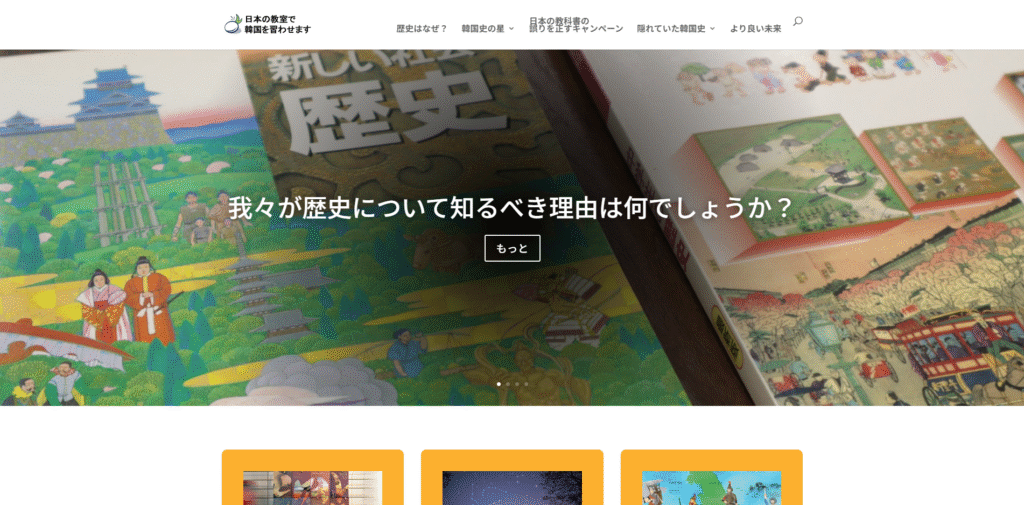
The Voluntary Agency Network of Korea (VANK) has launched a new website, “Let’s Learn About Korea in Japanese Classrooms!”, aimed at educating Japanese elementary, middle, and high school students about Korean history and culture that is omitted from their textbooks.
🔗 Visit the website
Currently, Japanese textbooks misrepresent Korea’s history and territory, such as falsely depicting Dokdo as “Takeshima,” claiming it is unlawfully occupied by Korea. In response, VANK has created this website in Japanese to provide students and teachers with accurate historical information.
VANK points out that the Japanese government has been distorting history through school textbooks, which not only fosters bias among students but also negatively impacts the future of Korea-Japan relations.
The website is structured into the following sections:
📌 “Why Study History?” – Explains the importance of learning history.
📌 “Stars of Korean History” – Introduces 5,000 years of Korean history, covering major dynasties such as Gojoseon, Goguryeo, Balhae, Silla, Baekje, Goryeo, Joseon, the anti-Japanese resistance era, and modern Korea’s economic and democratic development.
📌 “Correcting Japanese Textbooks” – Addresses distortions in Japanese textbooks regarding Korean history.
📌 “Hidden Korean History” – Highlights aspects of Korean history that are not covered in Japanese textbooks.
📌 “A Better Future” – Explores ways to improve Korea-Japan relations.
The website also features a section on “Korea’s Cultural Heritage Across Time”, showcasing historical treasures such as the Paleolithic hand axe, dolmens, the Goguryeo mural painting of an imaginary bird, the Baekje Gilt-bronze Incense Burner, Goryeo celadon, the world’s oldest metal-printed book Jikji, and Hangul, the Korean alphabet created by King Sejong.
Another key section, “Korea’s Maritime Heroes”, highlights historical figures who defended Korea’s seas, including:
— King Geunchogo
— King Gwanggaeto the Great
— King Munmu
— Admiral Yi Sun-sin
— Jang Bogo
— General Isabu
— General An Yong-bok
— The Jeju Haenyeo (women divers) who resisted Japanese economic exploitation during the colonial period
VANK emphasizes that the site aims to raise awareness among Japanese students and teachers about historical distortions in their textbooks. Many Japanese schoolbooks either misrepresent, downplay, or completely exclude key aspects of Korean history, including:
— Dokdo: Japan claims it as its territory despite it being historically and legally Korean land.
— Comfort Women Issue: Despite overwhelming survivor testimonies, the Japanese government denies its illegality and inhumanity.
— Forced Labor: The exploitation of Korean laborers is omitted, as seen in the cases of Sado Mine and Hashima Island (Gunkanjima), both registered as UNESCO World Heritage sites.
— Rising Sun Flag: Despite being a symbol of Japanese imperialism and wartime aggression, Japan continues to justify its use.
— Seikanron (Theory of Conquering Korea): A 19th-century justification for invasion that is resurfacing in the 21st century.
This year marks the 100th anniversary of the 1923 Great Kanto Earthquake, during which Japanese vigilante groups massacred Koreans. The website explains this event alongside Korea’s March 1st Independence Movement and the March 1st Declaration of Independence, demonstrating the Korean people’s resilience.
The site also criticizes the Japanese Ministry of Education’s curriculum guidelines, which reinforce distorted perspectives on Korea in school textbooks.
Japan did not mention Dokdo in its school textbooks before 2008. However, it has since intensified its territorial claims through education:
— July 14, 2008: The Japanese government officially included Dokdo as Japanese territory in middle school textbook guidelines.
— 2014: Both middle and high school textbooks described Dokdo as Japan’s “inherent territory” and falsely stated that Korea is “illegally occupying” it.
— 2017: The same claims were extended to elementary school textbooks.
These changes highlight Japan’s systematic efforts to rewrite history.
However, Japan’s Fundamental Law of Education states that education should “promote respect for other nations and contribute to international peace and development.” Thus, the Japanese government’s distortion of Korean history contradicts its own educational principles.
VANK hopes that this new website will serve as a valuable resource for Japanese students who are not given the opportunity to learn the truth about Korea’s history through their textbooks.